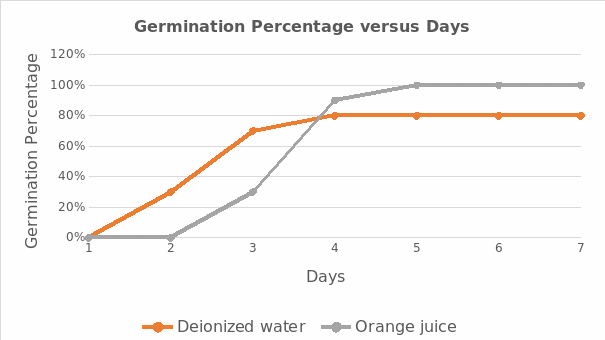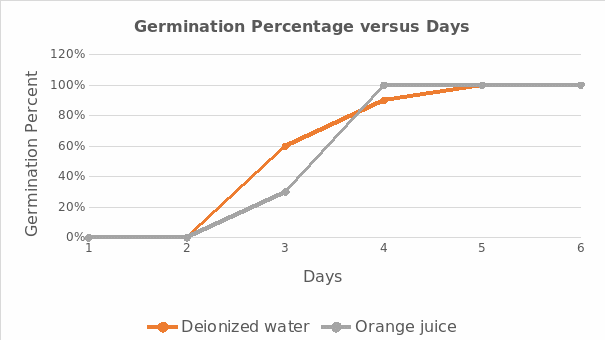Research Objective
The objective of the research is to determine the effect of the acidic condition of orange juice on the germination rate and growth of roots.
Introduction
The germination of seeds is a process that is dependent on many factors such as temperature, salinity, oxygen, moisture, and pH among other factors. A factor that is central to this study is pH because it has a considerable impact on the germination of seeds. According to Zhang, pH affects physiological processes that play a significant role in the germination of seeds (1621). Fundamentally, the amount of hydrogen ions and hydroxyl ions in a given solution determines the level of pH. For instance, a pH level of 1 has the highest concentration of hydrogen ions while a pH level of 14 has the highest concentration of hydroxyl ions. In this case, orange juice has high concentrations of hydrogen ions, which makes its pH be 2.8. Thus, the acidity of orange juice affects the physiological processes of germination leading to decreased rate of germination.
Since mung seeds are sensitive to pH, acidic conditions reduce the rate of germination in several ways. Germination of seeds requires hydrolysis of polysaccharides by enzymes. These enzymes are only active at slightly acidic pH ranges, and thus, low pH ranges inactivate or denature enzymes. Effective absorption of water is dependent on the integrity of the seed membrane. Lee states that acidic conditions reduce the absorption of water by seeds because it reduces the permeability of the seed membrane (435). Other evidence shows that acidic conditions affect the amount of water available for absorption. Malik et al. explain that acidic conditions affect germination by ionizing water molecules and consequently reducing the osmotic potential of seeds (28). Hence, acidic conditions create a physiological drought that limits the amount of water available for absorption and germination.
Hypothesis
The study hypothesizes that orange juice reduces the rate of germination and inhibits the growth of roots in germinating mung seeds.
Prediction of Results
The study predicted that the orange juice would decrease the rate of germination and inhibit the growth of roots because its pH is acidic (pH = 2.8). Since mung beans are sensitive to pH changes, low pH would significantly reduce the rate of germination. Ample evidence indicates that acidic conditions denature enzymes, which serve an important function of hydrolyzing polysaccharides and providing nutrients for growth (Zhang 1622). Moreover, acidic conditions inhibit the absorption of water by seeds because they affect the integrity of the seed membrane and reduce the osmotic potential of seeds by ionizing water molecules, hence, creating a physiological drought. Similarly, acidic conditions due to orange juice inhibit the growth of roots because it affects their integrity to absorb water optimally and creates physiological drought. Gordana et al. confirm that pH affects the germination rate and consequently the length of roots in seedlings (20). Therefore, enough evidence predicts that orange juice will reduce the rate of germination and slow down the growth of roots.
Methods and Materials
The experiment used 20 mung seeds, orange juice, paper towels, Ziploc bags, and deionized water. The mung seeds were separated into two parts comprising 10 mung seeds each. One part of the mung seeds were put in folded paper towels and wetted with 5ml of deionized water. The folded paper towels were then placed in a Ziploc bag and named control. Another part of the mung seeds was put in folded paper towels and wetted with 5ml of 5% orange juice. The folded paper towels were placed in a Ziploc bag and labeled experiment. The Ziploc bags were then sealed and placed in the drawer where there was no exposure to light and kept at the same environmental conditions with the constant temperature of 71 Fahrenheit for six days. The experiment was replicated using the same procedure. Observations were made daily between 10 am and 2 pm for six days, the number of seeds that germinated were counted and the length of roots was measured and the findings were tabulated.
Results
Number of seeds germinated.
The average of Length of roots for the second experiment.
Starch test for the first experiment.
Discussion
The results indicate that the germination of mung seeds is a slow process because it took six days for most seeds to germinate. The first experiment, as shown in Figure 1, indicates mung seeds placed in deionized water and orange juice germinated at different rates. During the first day, none of the mung seeds had germinated but during the second day, 30% of the seeds wetted with deionized had germinated while none had germinated in seeds wetted with orange juice. On the third day, 70% of the mung seeds in the control had germinated while 30% of the mung seeds had germinated in the experiment. During the fourth day, the germination percentage of mung seeds stagnated at 80% in the control until the sixth day while the germination percentage of mung seeds in control increased exponentially to 90% and attained 100% on the fifth day. These trends suggest that orange juice reduces the germination rate of mung seeds since, during the third day, 30% of mung seeds had germinated in orange juice while 70% had germinated in deionized water.
As the experiment was replicated, the second experiment depicts a similar trend as the first experiment (Figure 2). During the first day and the second day, none of the mung seeds had germinated. On the third day, the difference in the germination percentage was evident as 60% of the mung seeds in control had germinated while 30% of the mung seeds in the experiment had germinated. During the fourth day, the germination percentage of the mung seeds in control increased to 90% whereas the germination percentage of mung seeds in the experiment increased exponentially to 100%. The trends of germination percentage show that orange juice reduces the rate of germination because, during the third day, the germination percentage of mung seeds in orange juice was 30% while germination percentage in deionized water was 60%. These findings are consistent with earlier studies, which indicate that low pH reduces the germination rate of seeds (Malik et al. 28; Vicino-Bueno, Redondo-Gomez, and Figueroa 58). Hence, the findings support the hypothesis that orange juice reduces the rate of germination of mung seeds.
Graphs


In testing starch, the results indicate that mung seeds in both deionized water and orange juice have the same level of starch. The absorbance of the tested starch was 2.5 for both mung seeds placed in deionized water and orange juice. These findings illustrate that the level of hydrolysis was the same irrespective of differences in pH level. In a study done on red clover seeds, Agic et al. found out that the pH below 4 reduces the activity of α-amylase, and thus, affects the hydrolysis of starch (77). However, in this case, the findings infer that orange juice does not influence the hydrolysis of starch.
The results also indicate that orange juice affects the growth of roots because mung seeds grown in orange juice have shorter roots than mung seeds grown in deionized water. Specifically, the average length of roots of mung seeds in orange juice was 1.56cm while the average length of roots of mung seeds in deionized water was 2.97cm. The results, therefore, indicate that orange juice reduced the length of mung seeds’ roots by about 52% (1.56/2.97*100). In their study, Gordana et al. noted that low pH affects the growth of roots by inhibiting physiological processes (22). In this case, the findings support the hypothesis that orange juice inhibits the growth rate of roots.
Conclusion
Given that germination is a biochemical process, changes in pH affect it. In this case, orange juice has an acidic pH of about 2.8, which affected the rate of germination during the first three days and inhibited the growth of roots by about 52%. The starch test shows that hydrolysis was the same in the mung seeds placed in deionized water and orange juice. Analysis of the findings suggests that mung seeds germinate, and roots grow optimally at the slightly acidic pH range (pH of 4, 5, and 6). Moreover, at neutral pH, the germination percentage of mung seeds reaches 100% because they absorb water easily without the interference of osmotic potential.
Works Cited
Agic, Dejan, Gordana Bukvic, Sonja Grljusic, Drago Beslo, Janja Horvatic, and Dario Novoselovic. “Effect of pH on α-amylase activity and early seedling growth of red clover (Trifolium partense L.).” Notulae Botanicae Horti Agrobanici Cluj-Napoca 37.2 (2009): 77-80. Web.
Gordana, Bukvic, Sonja Grljusic, Vlatka Rozman, Dragana Lukic, Rajka Lackovic, and Dario Novoselovic. “Seed Age and pH of Water Solution Effects on Field Pea (Pisum sativum L.) Germination.” Notulae Botanicae Horti Agrobotanici Cluj-Napoca 35.1(2007): 20-26. Web.
Lee, Byong. Fundamentals of Food Biotechnology. Chichester, UK: John Wiley & Sons, 2014. Print.
Malik, Raul, Gupta Manisha, Lokendra Singh, and Vishal Deshwal. “Studies of different pH levels of simulated acid rain on Lens culinaris CVS.” Journal of Botanical Sciences 2.3 (2013): 27-30. Web.
Vacino-Bueno, Inmaculada, Susana Redondo-Gomez, and Enrique Figueroa. “Effect of pH on germination of the endermic healther, Erica andevalensis.” Journal of Aquatic Plant Management 47.1 (2009): 57-59. Web.
Zhang, Hai-yan. “Effects of simulated acid rain on seed germination and seedling growth of different type corn (Zea mays).” Chinese Journal of Applied Ecology 24.6 (2013): 1621-1626. Web.

